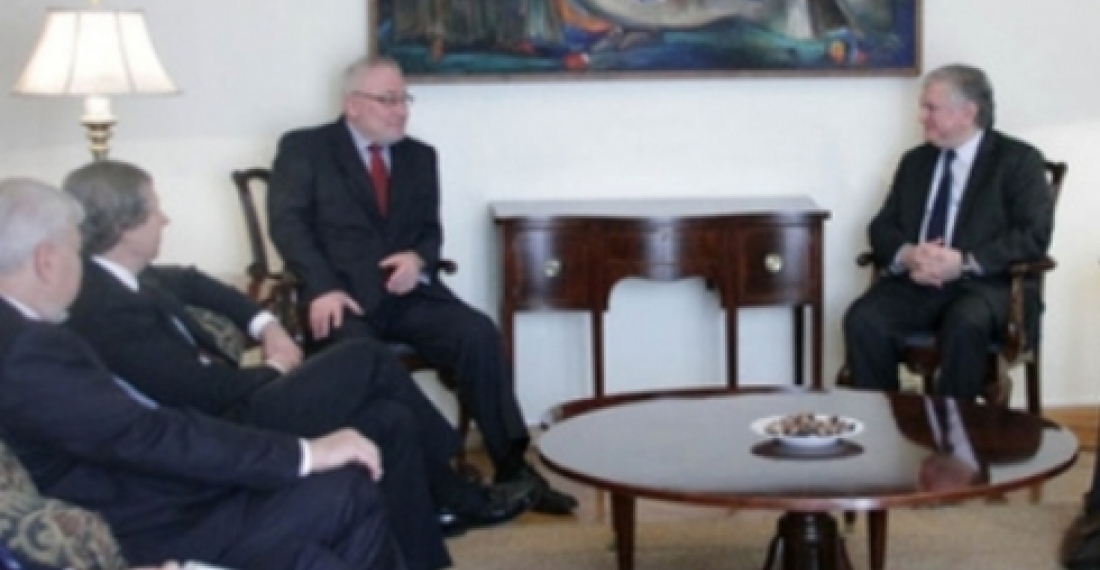Азербайджан обвинил Армению в отклонении предложения со стороны международного сообщества по созданию рабочей группы, которая начнет подготовку всеобъемлющего мирного соглашения.
Министр иностранных дел Азербайджана Эльмар Мамедъяров обвинил Армению в отказе от предложения по созданию рабочей группы, которая началабы работать над проектом всеобъемлющего мирного соглашения по урегулированию нагорно-карабахского конфликта. Во время официального визита в Тбилиси Мамедъяров заявил, что Азербайджан принял предложение по созданию рабочей группы для подготовки мирного соглашения, но когда сопредседатели прибыли в Ереван с этой идеей, армянская сторона отвергла такое предложение.
Мамедъяров заявил, что идея всеобъемлющего мирного соглашения обсуждалась в ходе саммита президентов Армении и Азербайджана с президентом Франции в Париже в прошлом году. Он сказал, что сопредседатели Минской группы во время их недавнего визита в регион предложили создать рабочую группу для разработки мирного соглашения за 6-12 месяцев, и Азербайджан принял эту идею. Сопредседатели затем прибыли с этой идеей к руководству Армении в Ереване. Мамедъяров заявил, что по сообщению азербайджанского агентства АПА, что "Руководство Армении ответило отказом этому графику. Я уже беседовал с американским сопредседателем, который сообщил мне, что руководство Армении отвергло предложение, выступило против деятельности какой-либо рабочей группы и начала работы над подготовкой мирного соглашения. Сопредседатели, вероятнее всего, будут определять, как построить работу в этом направлении. Мы должны приступить к этой работе и чем раньше, тем лучше. Это выгодно всем, в том числе и Армении. Азербайджан уже принял это предложение по созданию рабочей группы для работы над подготовкой мирного соглашения. Сейчас сопредседателям предстоит определиться, как говорить с Арменией".
Ранее министр иностранных дел Армении Эдвард Налбандян обвинил Азербайджан в попытке свести на нет результаты многолетнего переговорного процесса вокруг Основных принципов нагорно-карабахского урегулирования. Руководство Азербайджана пытается использовать по его же вине нерешенность конфликта, для оправдания грубейших нарушений прав человека, преследований оппонентов внутри страны. "Когда будет достигнута договоренность по Основным принципам, и на это даст свое согласие также Нагорный Карабах, тогда будет возможно начать разработку Азербайджаном, Нагорным Карабахом и Арменией всеобъемлющего мирного договора," - отметил Эдвард Налбандян.
В заявлении, опубликованном ранее в этом месяце, руководство организации по безопасности и сотрудничеству в Европе (ОБСЕ) сообщает, что "Минская группа Сопредседателей с полной поддержкой председателя ОБСЕ, готовы усилить переговорный процесс, что может привести к мирному завершению конфликта, который является шрамом всего региона слишком долго. Мы настоятельно призываем стороны проявить политическую волю и начать этот процесс сразу же, без оправданий".
источник: commonspace.eu по материалам агентст.
фото: Сопредседатель Минского процесса ОБСЕ встретились с министром иностранных дел Армении Эдвардом Налбандяном в Ереване во вторник, 17 февраля 2015 года (фото предоставлено пресс-службой МИД Армении).






